We’re continuing our chapter-by-chapter reflection of Leroy Garrett’s “What Must the Church of Christ Do to Be Saved?” with a move toward some very specific issues. I would remind as we get into these issues together that most people who discuss them speak in terms of “salvation issues.” Generally, those arguing for more freedom and more grace and bigger-picture thinking in these areas argue that they are not “salvation issues.” Those who argue for more rules and strict adherence to those rules claim to do so because these are “salvation issues.” Allow me to suggest that they are all “salvation issues.” My understanding of “salvation” has led me to conclude that everything is a “salvation issue.”
We get into discussions about “salvation issues” and we start ranking things in order of importance to God, in terms of what’s going to save us or condemn us. And we’ll talk about baptism and church and the authority of Scripture — sometimes we’ll even talk about worship styles — but we never talk about helping the poor or being kind to our enemies. Scripture maintains that those are actually the weightier matters. God has already spoken and made it very clear that he doesn’t give one rip about what we do in our worship to him if our lives are not consistent with his glory. If our lives are not about grace and forgiveness and acceptance and love and service, then whatever else we do with these so-called “salvation issues” simply doesn’t matter. In God’s book, salvation lies in the attitude of the heart. In God’s book, the motivations are what matter. Therefore, in my book, everything’s a salvation issue.
Where’s your heart? Are you motivated more by the Law or by the Spirit? Are your actions and thoughts Christ-like in that you’re considering the needs of others more important than your own? Do you tend to judge and condemn more than you love and accept? See? Salvation issues.
With that foundation in place, let’s consider Garrett’s eighth suggestion for saving our branch of the Christian faith:
Reexamine our position on instrumental worship.
Instead of writing this chapter of the book himself, Garrett gives us an article by Bob Shaw, a Church of Christ preacher in Alberta, Canada. Shaw preaches at an a cappella church and for 25 years fought bitterly against the use of musical instruments in corporate worship. But now he’s changed his stance. Today he sees the question of organs and guitars and drums as a matter of personal preference and congregational choice. Garrett and Shaw both claim we must all come to the same conclusion if the Churches of Christ are to be saved as a viable voice in the Kingdom.
Shaw lists eight reasons why he changed his position on instrumental music during Christian worship, some of them much better than others:
1. All biblical references to singing are addressed to the individual Christian and not to the assembled church. To be consistent, we’d have to say instrumental worship is as wrong at home and in our cars as it is in the auditorium on a Sunday morning. That’s a position we don’t normally take.
2. God is a just God. He’s not going to condemn millions of people for violating a law that’s not even found in the Bible.
3. If this were an important matter, God could have easily made it clear in the Bible. It would have only taken one line!
4. The psalms would not call on God’s people to do something that is sinful.
5. Good, honest, knowledgeable Christians do not see this issue the way we do. They respect the authority of Scripture just as much as us, yet they come to different conclusions.
6. The Bible does not clearly teach that instrumental music in worship is sinful.
7. God would not command the use of musical instruments in the Old Testament, condemn them in the New Testament, and then approve of them again in heaven (Revelation 15:1-3). A merciful and loving God would not give out instruments in heaven after condemning millions of others for using them.
8. The basic problem in all this is distinguishing between matters of faith and matters of opinion. The same argument that condemns instrumental music condemns Sunday Schools, Vacation Bible Schools, multiple cups for the Lord’s Supper, four-part harmony, and on and on. Until we realize that these are opinions over which we can agree to differ, we will continue to divide.
Again, some of these reasons are decent, some are better than others, and some of them, honestly, just don’t hold much water in a serious theological discussion. Shaw’s eighth reason there carries the most weight with me.
Here’s my personal angle on all this:
I favor the use of a cappella music in our corporate worship assemblies. I believe I will always push for a cappella , I will always teach a cappella, and I will always hold up a cappella as the best way for God’s people to sing praises to our Creator and Savior. I can definitely argue that from a historical position. That’s easy. During at least its first 700-900 years, Christ’s Church did not employ instruments of music in worship. I think I could also make a fairly decent argument theologically. There’s something about the many voices forming the one song; the many gifts, the many parts, becoming one, much like Jesus’ Church itself. Admittedly, however, I cannot make the argument from Scripture. It’s just not there.
In judging others and drawing lines of fellowship around the issue of musical instruments in worship, we have horribly distorted one of our fundamental Stone-Campbell maxims. We speak where the Bible speaks and, where the Bible is silent, we speak even more!
The “salvation issue” is in the way we label and accuse, divide and condemn, over musical instruments. The “salvation issue” is in the way we make up rules and draw inconsistent lines around our practices to protect a doctrine that doesn’t exist. It’s in the ways we interpret Scripture by one method when it suits us and by another method when it suits you. You know, the way we treat this issue communicates something to our people. It absolutely communicates. It communicates to our own people and it communicates to the outside world.
The ways we interpret the Bible and approve our policies sends the message to all who are still listening that Christianity is about following rules and drawing lines and adhering to boundaries. Never mind that the rules and boundaries make no sense. Following Jesus means following rules.
We must stop telling our people that it’s OK to worship in that way over there but not this way in here. We must stop telling our teens that it pleases God to sing that song in that room but singing this song in this room is a sin. We must stop telling one another that there’s nothing wrong with worshiping God in that style on this day but not in this style on that day. We’ve lived so long with and in our vain practices of protecting our own comfort zones and comfort rules that many of us will insist that weddings and funerals are not worship services. When you tell me that an assembly of Christians in the worship center in which the gathered men, women, and children sing songs of praise and thanksgiving to God, prayers are offered to God in the name of Jesus, Holy Scripture is read, and a sermon is preached from the Bible is not a worship assembly because the family of the deceased brought in a violist to play “Amazing Grace,” it makes no sense! Our kids are not stupid. Neither are the people we claim to be trying to win for Christ. They see right through this stuff. And I don’t blame them.
I agree wholeheartedly with Shaw’s final plea in this eighth chapter:
I would not favor going headlong in adopting instrumental music in a Church of Christ… It is right for us to sing a cappella as a matter of personal conviction. It also preserves unity among us. It is our attitude that we must change. Our neighbors resent our unloving, unaccepting, and condemnatory attitude toward those who differ with us, even when they envy our ability to sing. We must come to see a cappella singing as our tradition, the method that is better for us, and not a matter of faith and salvation for everyone else. Unless we do, honest, truth-seeking, unity-minded brothers and sisters will continue to leave us.
I’m blessed to belong to a church family and to serve with church leaders here in Amarillo who are completely committed to our a cappella heritage. We view it as something of which to be very proud. We love it. And we’re dedicated to it. And not one of us can ever imagine that changing. At the same time, we understand that musical instruments in a sermon video, in an announcement, during a wedding or a funeral or a youth campout, or as accompaniment to some special music even in a Sunday assembly in no way compromises that commitment. In no way. We refuse to condemn those who worship with a band. We accept as brothers and sisters all those who submit to the Lordship of Jesus and are striving to live their lives in ways that bring glory to God.
Afterall, it is a salvation issue, right?
Peace,
Allan
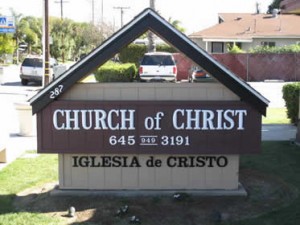

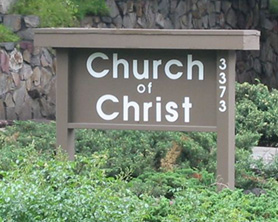



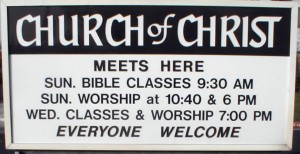
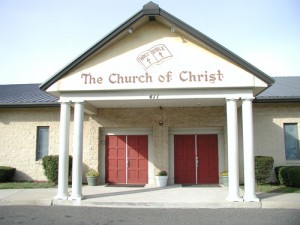


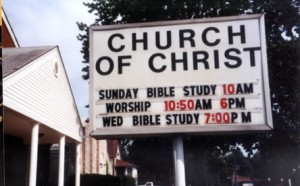
Recent Comments